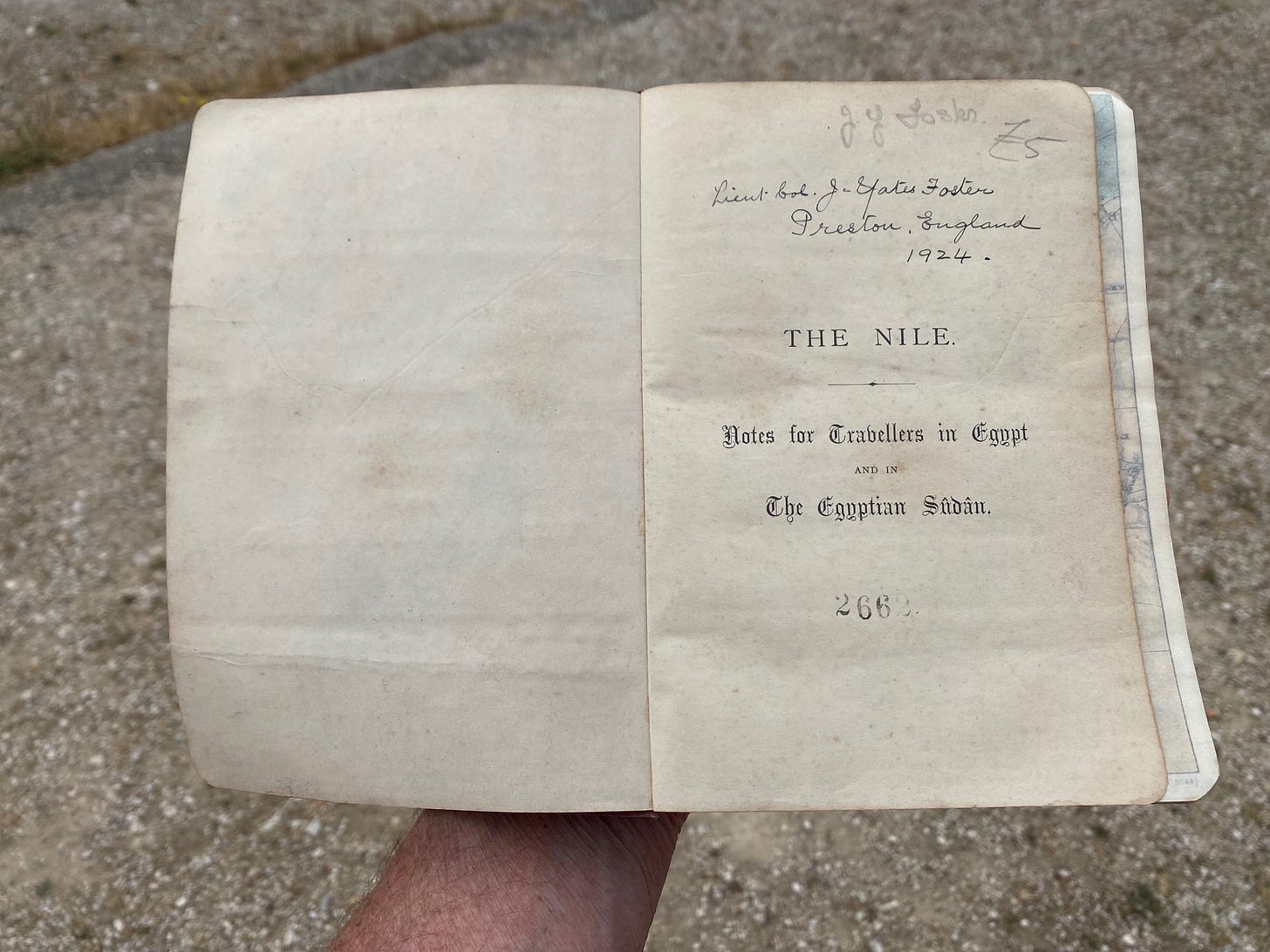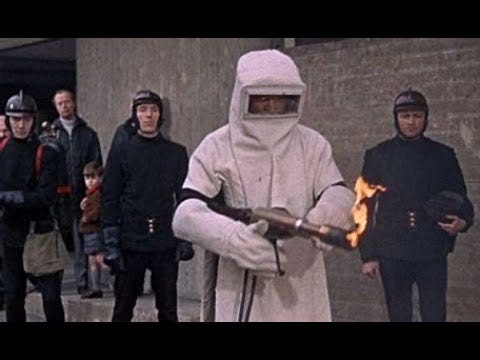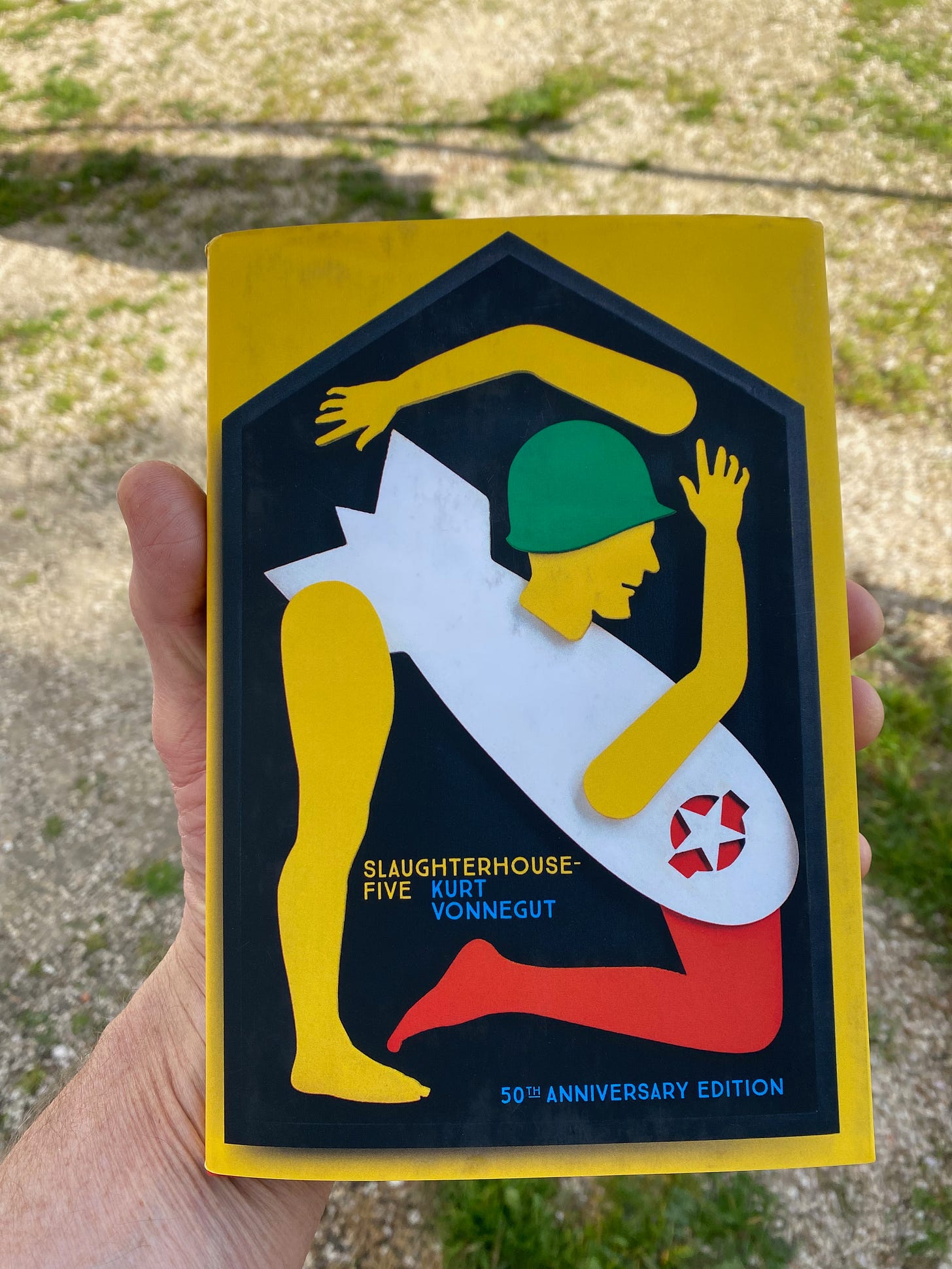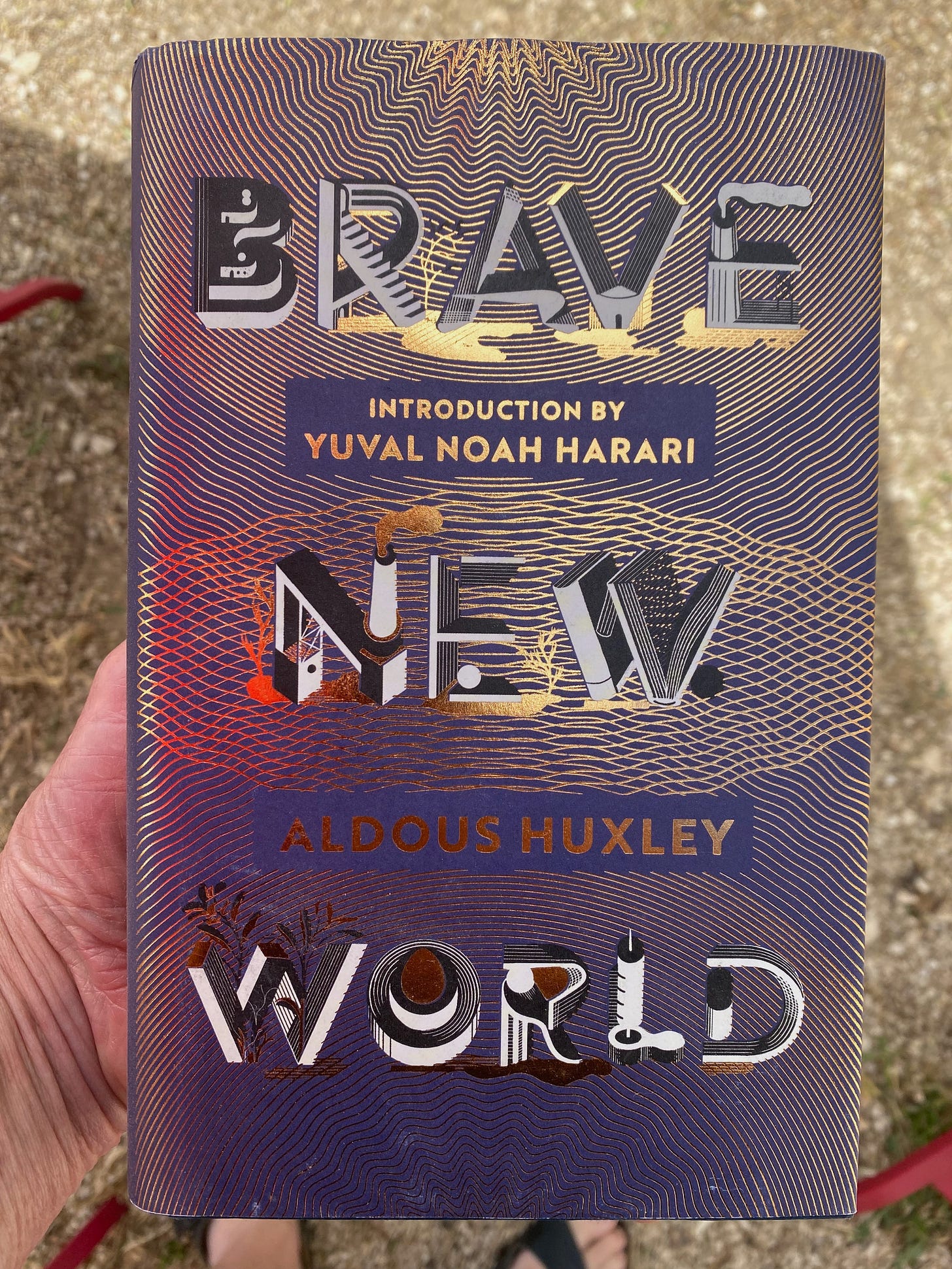Five books
We own a lot of books. Paper books. Books that we look at. Books that we read. Books that we stick on the coffee table. We love books. Here are five 'must reads' for your consideration.
For a long time now, the smartphone has dominated my life. I am not alone and like mosquitoes to light, everyone is drawn to them.
The crunch came when we were not sleeping well. Waking up, consulting Mastodon, Facebook, Instagram and worst of all YouTube, where you can easily be drawn into hours of watching and listening.
In the morning we were waking up later and later, feeling like the Walking Dead with no desire to be creative.
Our friend and keyboard player Christian Madden has recently restarted his blog on Substack. He is a very thoughtful, well-read chap and one of his articles, Worst Friend mentioned Slaughterhouse-Five, a book by Kurt Vonnegut.
Believe it or not, I had never read his work. After delving into Vonnegut’s story, I was intrigued and immediately ordered a hardback copy which started to rekindle my literary love affair.
Lonely child
From an early age, I really got into books.
My first school was in Bolton, a fair distance away from our family home in Bury. My second was even further away in Scarisbrick near Southport and hence most of my friends were inaccessible.
I am an only child and to keep me occupied and out of mischief, my mum and dad bought me at least one book a week which I joyously devoured.
Around the age of 12, I discovered Norman Hunter and his series of books based around Professor Branestawm, the bumbling absent-minded Professor: I loved the inventions he created and the chaos surrounding them.
I moved on to fantasy and sci-fi, and by that stage was consuming paperbacks at a dizzying rate.
Isaac Asimov, Phillip K Dick, Frank Herbert, Robert Heinlein, Jules Verne, H.G. Wells, Arthur C Clarke, Michael Moorcock, Aldous Huxley, George Orwell, Ray Bradbury and then influenced by my dad's adventure novels by Alastair McClean plus many others.
These hundreds of paperbacks travelled with me through many house moves but around 2001 I passed them on to the new generation of readers via a charity shop in Clitheroe.
The ones I kept hold of were the practical ones. Scientific, technical and some connected to a memory or place which have stayed with me through moves to the UK, Isle of Man, France, Spain, Germany and now Portugal.
I picked up this lovely cloth-bound book at a flea market many years ago now. It's full of marvellous illustrations and maps, you know the type, printed on carefully folded tracing paper.
I have never read it in full. Perhaps now is a good time to start.

Practical
I never thought they could be useful other than for reading, but when we opened our first commercial recording studio in Valencia, Spain we used books to line one end of the live room to help the absorption and reflection of sound.
What’s with e-readers?
I just can’t do it.
From a technology point of view, we are all over it, utilising all the digital world has to offer, but our love for books is not just about the content.
Although convenient, tablets and Kindle type devices lack soul. I do read the news using my phone or iPad, but nothing is more satisfying than a weighty tome.
Like our music listening experience, we prefer analogue media: vinyl & hardback books are a match made in heaven. Their tactile nature, look and presence make them irresistible.
Making music is the same. Real guitars, keyboards and amplifiers ‘feel’ and sound better to us. Bulky and heavy yes, but bulky and heavy (generally) = vintage.
All this is good until you come to move house or go on tour where the physical price is paid for being so analogue.
Four more…
I listen to a pile of new albums every week, trying to keep up with what is going on, pushing my ears and perceptions in new directions and intend to use a similar methodology with books. Our new album, Starlite.One, explores dystopian themes and following Vonnegut, considered it appropriate to revisit three classics which I first read in my teens.
Slaughterhouse-Five | Kurt Vonnegut
Kurt Vonnegut was an American writer and humorist known for his satirical and darkly humorous writing. He published 14 novels, three short-story collections, five plays, and five nonfiction works over fifty-plus years. Slaughterhouse-Five is a 1969 semi-autobiographical science fiction-infused anti-war novel.
It wasn’t long before I firmly attached myself to the style and syntax of this excellent author. There are countless reviews and analyses of this superb and highly original piece of writing by people far more qualified than I, but from my perspective, it is still disquietingly relevant in these troubled times.
So it goes
Nineteen Eighty-Four | George Orwell
Eric Arthur Blair was an English novelist, poet, essayist, journalist, and critic who wrote under the pen name of George Orwell.
Nineteen Eighty-Four has become a classic literary example of political and dystopian fiction. It also popularised the term "Orwellian" as an adjective, with many terms used in the novel entering common usage, including "Big Brother", "doublethink", "Thought Police", "thoughtcrime", "Newspeak", and "2 + 2 = 5". Parallels have been drawn between the novel's subject matter and real life instances of totalitarianism, mass surveillance, and violations of freedom of expression, among other themes.
I had forgotten how good this book was and now more relevant than when I first read it back in 1976. This was before the days of publicly accessible two-way video communication and the telescreen was still a thing of the future as is the now daily reality of doublethink.
The concept of the telescreen has been explored as a metaphor or allegory for the erosion of privacy in totalitarian regimes, as well as in the modern era in the context of Internet- and cellular-based devices that allow for the surreptitious collection of individuals' audiovisual data, frequently without their explicit consent or awareness.
The chicken or the egg
I often wonder if literary works predict or influence the future.
For totalitarian leaders or those hell-bent on power and control, it’s so easy to take this and the other two dystopian classics discussed later, as templates. It seems to me like Roger Stone certainly took a leaf out of Orwell’s book and has made a career from making abject lies the truth.
IGNORANCE IS STRENGTH | WAR IS PEACE | FREEDOM IS SLAVERY
Watch this documentary…
Brave New World | Aldous Huxley
Aldous Leonard Huxley was an English writer and philosopher. His bibliography spans nearly 50 books, including novels and non-fiction works, as well as essays, narratives, and poems.
Brave New World was written in 1931 and published in 1932. Largely set in a futuristic World State, whose citizens are environmentally engineered into an intelligence-based social hierarchy, the novel anticipates huge scientific advancements in reproductive technology, sleep-learning, psychological manipulation and classical conditioning that are combined to make a dystopian society which is challenged by the story's protagonist.
This novel is often compared as an inversion counterpart to Orwell's Nineteen Eighty-Four.
92 years after its publication, the book is on numerous censored lists worldwide as many parents and teachers argue that the novel’s themes of promiscuity, self-harm, and overall negativity are not suitable for children.
Of all the books mentioned here, I find this the most challenging read. The language is thick and as you would expect, somewhat old-fashioned. The content however is far from that and the novel’s take on dystopia still influences me.
Brave New World describes a perfect world with no poverty, sickness, or sadness - so what is society missing?
A really efficient totalitarian state would be one in which the all-powerful executive of political bosses and their army of managers control a population of slaves who do not have to be coerced, because they love their servitude.
Fahrenheit 451 | Ray Bradbury
Ray Douglas Bradbury was an American author and screenwriter. One of the most celebrated 20th-century American writers, he worked in a variety of genres, including fantasy, science fiction, horror, mystery and realistic fiction.
Fahrenheit 451 is a 1953 dystopian novel presenting a future American society where books have been outlawed and "firemen" burn any that are found.
The novel follows in the viewpoint of Guy Montag, a fireman who soon becomes disillusioned with his role of censoring literature and destroying knowledge, eventually quitting his job and committing himself to the preservation of literary and cultural writings.
The rise of Woke, the far right and religious fundamentalism are all, through their individual ideology, suppressing freedom of speech and expression.
On one hand sensible liberal thinkers (as we aspire to be) are castigated for some of our views on ‘Wokeism’ which is rampaging throughout the West and certainly in the music business.
On the other hand, access to both the written and spoken word in totalitarian regimes, both left and right, are censored worldwide and books burned.
Should people be allowed to demonstrate peacefully? Yes. Is freedom of speech and expression vital to a balanced society? Yes. Who has the right to censor us? Should we try and bury history by removing statues that celebrate uncomfortable moments from the past or recontextualise them to serve as reminders?
My wife and artistic collaborator, Suzy think a lot about these things and earlier this year wrote an artist statement summarising our view of the world and our art. Check it out and tell us what you think.
Anyway, back to Ray and Fahrenheit 451.
There have been a few film adaptations but this is my favourite. Get a load of the fabulous direction and imagery in Franƈois Truffaut’s version from 1966.
Generations of readers, myself included, resonate with Bradbury’s arguments in favour of literature and critical thinking and against censorship and blind conformity. I wonder what his opinion would be of world events in 2024.
It was a pleasure to burn…
Film Noir | Editors Paul Duncan & Jürgen Müller


Back in February, we were treated in royal style to a couple of days away in Lisboa by a good friend of ours who was celebrating her birthday.
We stayed at The Editory Riverside and in the reception area happened by chance upon this cool book - Film Noir - and had to order it.
It’s full of striking and evocative imagery from a bygone era, oozing with style and elegance.
And finally…
I hope you have enjoyed this article and would love to read about your favourites by commenting below.
Much love
Simon
Suzy and I independently select all recommendations featured in our articles. When you buy something through the retail links, we may earn an affiliate commission, which helps pay for our time creating this article.










